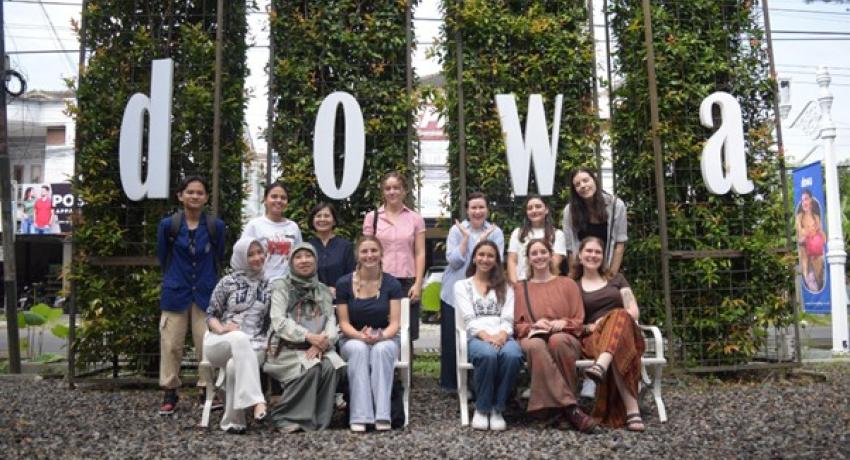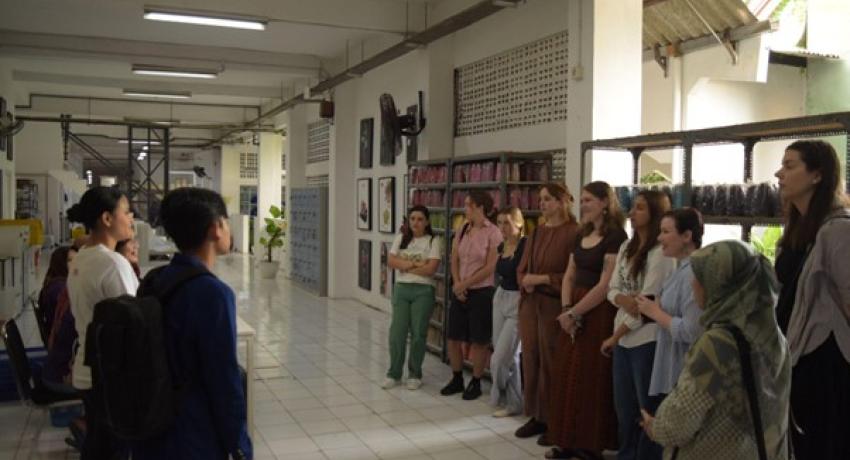As part of their cross-cultural learning and field exploration program, Universitas Negeri Yogyakarta (UNY) and Western Sydney University (WSU) conducted an insightful visit to the DOWA production center on Tuesday, May 6, 2025. The visit aimed to explore the local creative industry while emphasizing values of social empowerment, work ethic, and community-based craftsmanship especially focusing on the role of women.
The visit was guided by Mrs. Nining, a senior DOWA artisan, with field coordination led by Yosi Septa Mutiarni, S.T., M.Sc., and Prof. Anita Triastuti, Ph.D. The group consisted of WSU lecturers and students, UNY International Office Student Employees, Liaison Officers, and a documentation team from UNYtech TV.
Upon arrival, the participants were warmly welcomed and introduced to the entire production process of DOWA bags—from yarn selection to finishing touches. Most of the artisans are women from various regions across Indonesia, not only Yogyakarta, including areas like Kulon Progo, Bantul, and Sleman. DOWA adopts a home-based working model that enables women to remain economically productive while maintaining their roles in the household.
This inclusive approach empowers women of diverse backgrounds and ages, offering them a path to financial independence and dignity through skilled craftsmanship. One particularly moving moment occurred when WSU students observed a craftswoman sewing a bag while keeping a photo of her late husband at her workstation—a simple yet heartfelt act that deeply touched the visitors.
WSU participants were also impressed by the sense of nationalism embedded in the company culture. Each day at 10:00 AM, all workers pause their activities to stand in respect and sing the Indonesian national anthem. Additionally, the strict no-phone policy during working hours reflects a high level of discipline and professionalism, which the WSU group praised as exemplary.
In a lively discussion session, participants learned that DOWA has not only succeeded in the local market but also exports its handcrafted components and raw materials internationally. This reinforces DOWA’s position as a globally recognized fashion brand rooted in Indonesian identity—blending the artistic precision of local artisans with international fashion standards.
Surprisingly, the WSU students expressed astonishment at how affordable DOWA products are, given the intricacy and manual labor involved in the production. “In Australia, handmade bags with this level of detail would typically cost two to three times more,” noted one of the students. For them, DOWA is not just a fashion label—it represents the spirit of resilience, heritage, and women’s empowerment.
The visit offered a valuable cultural and philosophical learning experience, highlighting how a local industry can serve as a platform for gender equality, economic resilience, and social reflection. More than just fashion, DOWA tells the story of a thread—transformed by the hands of strong, skillful women into pieces of beauty and pride. It is a story of prayer, passion, and perseverance woven into every stitch, inspiring all who carry it.






